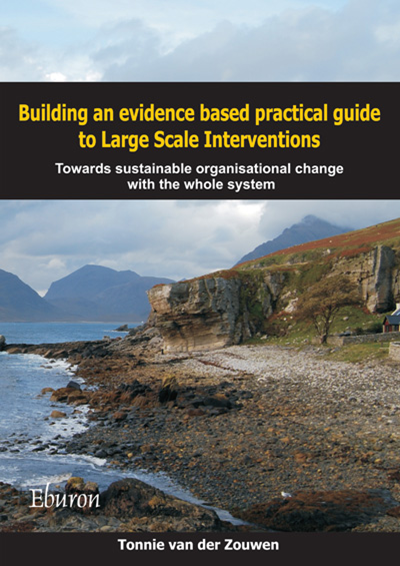Evaluatie instrument voor de effectiviteit van complexe interventies voor organisatieverandering
 In mijn onderzoek naar effectief gebruik van Large Scale Interventions heb ik een evaluatie instrument ontwikkeld. Het is gebaseerd op audit methodieken zoals die gebruikt worden voor de toetsing van kwaliteitsmanagement systemen, bijvoorbeeld ISO 9000. De ‘norm’, de set van kwaliteitscriteria, is ontwikkeld door een synthese van bestaande wetenschappelijke kennis en praktijkervaring. Lees meer in mijn boek Building an evidence based practical guide to Large Scale Interventions. Towards sustainable organisational change with the whole system.
In mijn onderzoek naar effectief gebruik van Large Scale Interventions heb ik een evaluatie instrument ontwikkeld. Het is gebaseerd op audit methodieken zoals die gebruikt worden voor de toetsing van kwaliteitsmanagement systemen, bijvoorbeeld ISO 9000. De ‘norm’, de set van kwaliteitscriteria, is ontwikkeld door een synthese van bestaande wetenschappelijke kennis en praktijkervaring. Lees meer in mijn boek Building an evidence based practical guide to Large Scale Interventions. Towards sustainable organisational change with the whole system.
Als u een Large Scale Intervention proces, of een andere complexe interventie voor organisatieverandering wil evalueren dan kan deze methode een waardevolle bijdrage leveren. Op deze site kunt u een samenvatting van het evaluatie instrument downloaden, en aanvullende checklisten en score formulieren. Ze zijn vrij beschikbaar als u mijn naam en de bron vermeldt.
The book is an interesting combination of research and practical experience in different formats of Large Group Interventions like LGI, Future Search, Open Space, etc. The author has addressed both the logical and the emotional dimensions that are dealt with during the LGI processes. The book gives a detail and a clear understanding of the differences between the Large Scale Interventions and conventional top down conferences. It is a comprehensive book dealing with the principles, steps, benefits, cautions, and other related aspects for the practitioners of LGI. The most interesting part is the evaluation of the LGI processes, and their assessment in terms of their sustainability. The book can be very useful for practitioners of LGI in any format, as well as researchers and graduate students who wish to consider entering the field of participatory change. (Dr. Kiron Wadhera, Asian Centre for Organisation Research and Development)
This book is the first data based, detailed book at large scale interventions and their effectiveness, when evaluated against the parameter of sustainability. Tonnie also looks at evidence-based approaches in medicine, social work, management, finance, education and consultancy, and explores some of the pros, cons, and dilemmas. The Bibliography itself shows the wide range of relevant references, and can be quite an education, depending on how one chooses to use it. A must read for practitioners, consultants, academics, researchers, and members of management of any organisation in any sector. (Prof. George Koreth, Asian Centre for Organsation Research and Development)